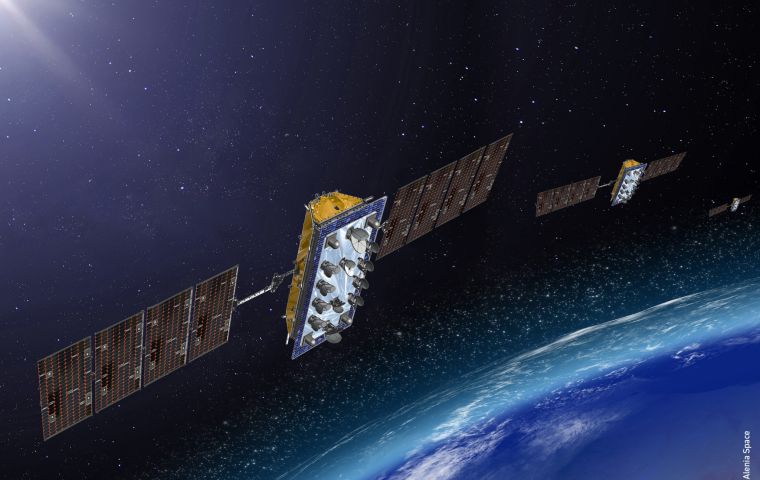MercoPress. South Atlantic News Agency
Falklands testing ground for satellite system that could revolutionize mobile connectivity
 The new system could have major implications for phone coverage. “We’re like a space cell tower roaming company,” says Tyghe Spiedel, the co-founder of Lynk
The new system could have major implications for phone coverage. “We’re like a space cell tower roaming company,” says Tyghe Spiedel, the co-founder of Lynk A new satellite system that could revolutionize mobile connectivity has been tested successfully, setting a new world record in the process, according to its inventor. Tyghe Spiedel is the co-founder of Lynk, a company that builds very small satellites designed to communicate with standard mobile phones.
“It’s quite literally taking typical mobile terrestrial coverage, putting it on a satellite in orbit and then extending that coverage to everywhere around the globe,” he told the Falklands' weekly Penguin News.
“We have successfully demonstrated sending a mobile SMS message from a satellite to a mobile phone here in the Falkland Islands, on February 24. It’s the first time in history that’s ever been done. So the Falkland Islands owns this world record now.”
The new system could have major implications for phone coverage. “We’re like a space cell tower roaming company,” says Tyghe. “We work with terrestrial mobile network operators to extend their mobile coverage. They would retail it to the markets that they’re in and then we would just have a wholesale agreement and their subscribers could roam under our space network.”
The Islands have proved a fertile testing ground for Tyghe’s company. “It’s actually a fantastic test site for us; we have our satellites in orbit at an inclination around the Earth that allows for many overpasses here, relative to the rest of the world … So it’s very ideal for testing right now, but for the commercial service you guys would see better service here than at the Equator I would say.”
With the Falklands as the testing ground, Tyghe is working towards nothing less than a revolution in worldwide communications. But it also comes with benefits specific to the Islands.
“There are geographical challenged areas around the Islands that it doesn't make a lot of economic sense to build a cell tower. So what we offer to our mobile network operator partners is the ability to put their spectrum on a satellite and it effectively reduces the cost per square mile by four orders of magnitude to deploy services in remote rural areas.”
Suddenly, it can become cost effective to provide coverage in remote areas. “Not only land but the oceans, where it doesn't make sense to provide coverage. So here in the Falklands, the big fishing industry, folks are out on boats and often very disconnected … but every fisherman’s got a phone in their pocket, you know?
So they can remain connected in that regard, and then of course there are certainly emergency use cases. The first SMS that we sent was actually an emergency cellular broadcast, sort of a one-to-many communications scheme, so if there’s bad weather coming and there’s a boat out on the ocean, and they don't have a terminal that they can communicate with, and they have a phone, then we can notify them.”
After gaining a degree in mechanical engineering and aerospace engineering, Tyghe spent a lot of time in graduate school lot of his time in graduate school building ‘nano satellites’. He then worked at NASA, on Mars Rovers, before getting involved in space telecommunications.
This expertise could now be directly useful to the Falklands, especially those living in Camp. “It’s kind of two things. It’s that, folks here who have a SIM card, they’ll be able to roam onto our network in the same way that they would be able to roam onto a network in another country. We can provide a layer of resiliency as well for just general communications on the Islands. For instance, the dish gets knocked down or the satellite that it’s talking to gets knocked out, there’s a single point failure there, we would provide an additional layer of IP connectivity, so that while things are getting fixed up, we could temporarily take over and maintain connectivity for people on the Islands.
“And it’s relevant for locals and tourists, so when folks come to the Islands they want to be connected, and they can do so in Stanley, but a lot of the interest is in seeing penguins in remote areas, and it would be nice to be able to take a picture and send a text message while you're out there.” (Penguin News).




Top Comments
Disclaimer & comment rulesCommenting for this story is now closed.
If you have a Facebook account, become a fan and comment on our Facebook Page!